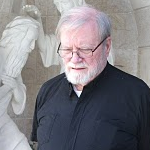 by Fr. Patrick Henry Reardon
by Fr. Patrick Henry Reardon
It would be easy to suppose that the Gospels, because they fill the first pages of the New Testament, represent the earliest literary exercise in Christian biography. This is not the case, however; the Epistle to the Galatians predates the earliest of the Gospels (Mark) by more than a decade. And if we don’t think of Galatians as a work of Christian biography, we are not reading it very carefully.
The biographical aspect of Galatians is, of course, autobiographical. Indeed, it represents a special form of autobiography; it is a “personal apologetic.” It is Paul’s defense of his life and ministry, directed against those detractors who claimed he was no real apostle and possessed no valid teaching authority in the Church. To refute those detractors, Paul first appealed to the facts of his life, and that appeal began with the opening chapter of Galatians.
In his two earlier epistles—to the Thessalonians—Paul was content to identify himself simply as “Paul.” With Galatians, however, Paul started identifying himself as “Paul, an apostle of Jesus Christ,” sometimes with the addition of “by the will of God.”
This designation is emphatic in the case of Galatians, where he begins,
“Paul, an apostle, not from men nor through man, but through Jesus Christ and God the Father who raised Him from the dead . . .”
The point of Paul’s insistence here is that his connection to Jesus is immediate—
“that the gospel which was preached by me is not according to man. For I neither received it from man, nor was I taught but through the revelation of Jesus Christ.”
It is in support of this apologetic claim that Paul turns to autobiography, reminding his readers how he started as a seriously observant Jew—even to the level of persecuting Christians. However, this all stopped, says Paul, “when it pleased God, who separated me from my mother’s womb and called me through His grace, to reveal His Son in me.”
This autobiographical comment, which is the first extant account of a Christian’s conversion, is significant in several ways:
First, although Paul was certainly not the first convert, he was the first to write about his conversion. Christian literary reflection did not begin with the biography of Jesus but with the testimony of a believer’s internal and existential conviction.
Second, even though Paul—as far as we can determine—never knew Jesus “in the days of his flesh,” he considered his knowledge of the Savior not one whit inferior to that of the original apostolic band.
Third, the defense of Paul’s ministry rested on an immediate, conscious, and existential certainty; it was inseparable from the transformation of his mind, initiated
“when it pleased God . . . to reveal His Son in me.”
Fourth, it was the very God of Israel—the God Paul always strove to serve—who revealed this Son. The revelation given in Jesus was not the disclosure of a God hitherto unknown. What was new was this God’s relationship to Jesus. It was because of Jesus that Paul could call this God
“our God and Father” (1:4).
Fifth, it was this “God and Father” who inwardly drew Paul to Jesus as His Son. Therefore, Jesus could say to Paul—as he said to Peter—
“flesh and blood has not revealed this to you, but my Father who is in heaven” (Matthew 16:17).
Jesus enunciated the principle involved in this revelation:
“No one can come to me unless the Father, who sent me, draws him” (John 6:44).
The Epistle to the Galatians is our earliest literary record of this perception, later elaborated in Christian theology: God’s design of, and gracious influence on, man’s conscience, so that he might be drawn to the knowledge of the Son.
 Inquiring how God draws the human mind to His Son, William of St. Thierry answered,
Inquiring how God draws the human mind to His Son, William of St. Thierry answered,
“By creating in him and inspiring in him a free will by which he may freely choose that which he chooses; this is so that what he chooses rightly may be of his own volition. By God’s inspiration we make a voluntary assent of the mind . . . If you choose, you believe, but you do not choose unless you are drawn by the Father. And if you do choose, you are drawn by the Father” (The Mirror of Faith 4).
Before a single one of the Gospels was written, a theological controversy in Galatia prompted the Apostle Paul to examine his memory and conscience respecting the experience of his own conversion. The dynamic reality of the Gospel lived in the human conscience before it was consigned to writing.
